► Porsche 919 Hybrid Evo Ring record
► Maximum racer: shorn of WEC rules
► Beats Stefan Bellof’s 1983 record
The Porsche 919 Hybrid Evo has shattered the 35-year-old lap record of the Nurburgring – in a devastatingly rapid 5min 19.546sec.
Porsche is spending the morning at the Nordschleife trying to set the fastest possible time, with dab hand Timo Bernhard, 37, at the wheel. He’s a two-time Le Mans and WEC champion driver, so no stranger to driving LMP1 cars at the limit.
They’ve already broken the 1983 record set by Stefan Bellof, who set the existing record in a Porsche 956 C. His time of 6min 11.13sec has stood unchallenged for nearly four decades.
Conditions at the Nurburgring were bright and cool – perfect for a race car to perform at its peak over the 12.9-mile track.
An earlier Spa record
Porsche’s ‘Evo-version’ of its Le Mans winning 919 Hybrid set a new track record at the legendary Spa-Francorchamps in spring 2018. Porsche’s Neel Jani set a time of 1min 41.770sec in the heavily modified LMP1 car, smashing the existing record – Lewis Hamilton’s pole time of 1min 42.553sec for the 2017 GP – by around seven tenths.
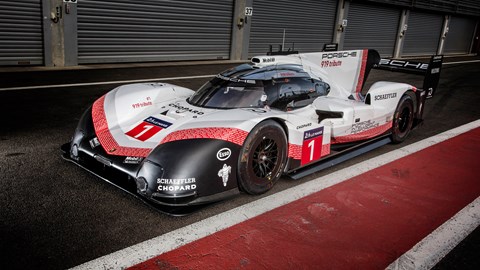
‘This was an absolute fantastic lap – an outstanding drivers’ performance from Neel and the result of great engineering,’ said Fritz Enzinger, vice president of Porsche’s LMP1 programme. ‘Our target was to show what the Porsche 919 Hybrid is able to do when we loosen the restrictions that normally come from the regulations.’
‘The 919 Evo is brutally impressive. It is definitely the fastest car I ever drove. The grip level is at a fully new dimension for me, I couldn’t imagine this amount beforehand,’ said Jani. ‘The speed on which everything happens on a single lap with the 919 Evo is that fast that the demand on reaction speed is very different to what I was used to in the WEC. We are not only faster than the F1 pole from 2017. Today’s lap was twelve seconds faster compared to our WEC pole position from last year!’
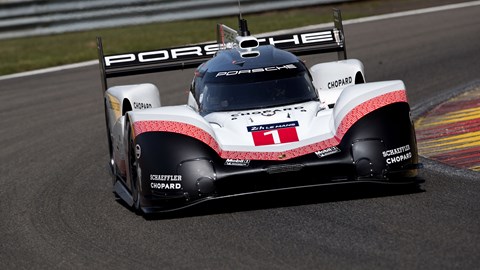
The main tech differences: Porsche 919 Evo specs
Alongside the news, Porsche has also unveiled pictures of a liveried up version of the Evo and revealed some key differences between the Evo and the LMP1-constrained racer it’s based on. Some of the changes were planned for the stillborn 2018 car, while others were thought up specifically for the tribute project.
Like the 2017 racer, the 919 Hybrid Evo is powered by a 2.0-litre turbocharged V4 engine with ERS. However, a lack of fuel-flow regulations and updated software mean power has risen from 493bhp to to 710bhp. LMP1 rules meant the 919 could only use 6.37 megajoules of ERS energy per lap, but with the regulations absent, Jani benefitted from 8.49 megajoules of ERS energy. In old numbers, that meant a rise from 394bhp to 433bhp.
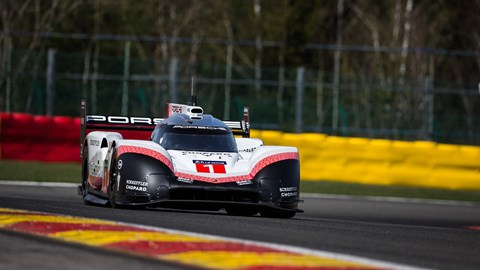
To cope with the increased power, Porsche was also able to fit a huge new front diffuser and massive rear wing, which hangs off the back of the car – incredibly illegal in current LMP1 rules. As you’d expect, both of these systems are actively controlled too, so the driver can choose between maximum downforce or minimum drag, depending where they are on the track.
Porsche says the new aero, along with some highly illegal side skirts, has resulted in a massive 53% more downforce, and increased aero efficiency by 66% (compared to the 2017 car’s aero configuration at the same track.)
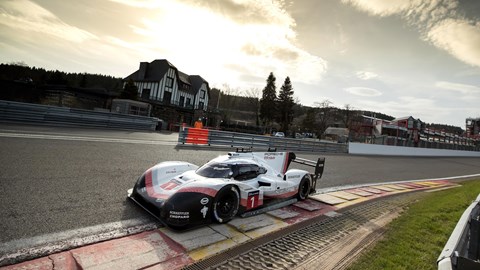
That extra aero and power means the 919’s power steering has been beefed up – but it’s also gone on a diet, too. Everything that the 919 didn’t need for single lap pace – such as windscreen wipers, sensors and light systems was removed, bringing the dry weight down 39kg to just 849kg. Michelin has also shod the 919 Evo with some higher performance tyres, too.
If that’s not enough, Porsche says it’ll be taking its LMP1 racer down to the Nurburgring 24 hours, and then to Brands Hatch for the 70 years of Porsche event.
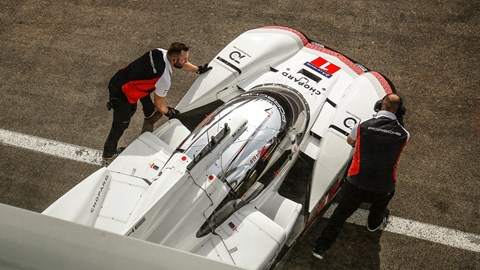
Faster than F1?
While it’s significant that the Porsche 919 Hybrid Evo is faster than an F1 car, it’s no real surprise. Just like the 2017 version of the 919 Hybrid, modern Formula One cars must adhere to a long, complex set of rules – and are probably more constrained than their LMP1 siblings.
However, it’s still interesting to see what the limits of an LMP1 style car can achieve when the rules are loosened. And it’s even better that Porsche just had to try it.